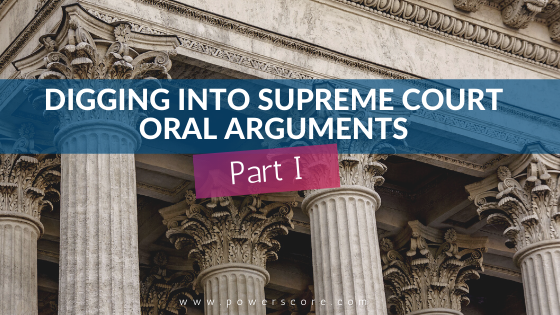A question we get frequently is what to do when you want to continue studying for the LSAT but you need a break from drills and questions. One fantastic resource is the Oyez Project, an online archive of Supreme Court of the United States (SCOTUS) oral arguments, currently maintained by the IIT Chicago-Kent College of Law. In this post, we’ll give you a short introduction to the Oyez Project and links to a few of the most interesting oral arguments available on the site. This is the first post in a series. Periodically, we’ll highlight other cases that you might find interesting.
What is the Oyez Project?
The Oyez Project site provides a complete history of the Project, from the controversy that embroiled the first efforts to make SCOTUS oral arguments available to the general public, to the current expansions to the program made possible by grants and donations. In short, the Project’s main mission is to provide free, online access to all of the recorded SCOTUS oral arguments from October 1955 through the Court’s current cases. In addition to providing the Court’s oral arguments, the Project has expanded to provide in-depth analysis of various issues, a visual tour of the Supreme Court building, and links to the opinion from each case. You can search the site by date, issue, or keyword.
How to Utilize the Database for LSAT Prep
A great plan of attack is to pick an issue, find a case that may interest you, and then explore the case from all angles. For example, let’s say that you have an interest in the abortion debate. You can start with the companion cases of Doe v. Bolton, 410 U.S. 179 (1973) and Roe v. Wade, 410 U.S. 113 (1973), both argued and decided on the same days.
Though it may seem counterintuitive, a good way to prepare to hear and understand these oral arguments is to read the respective opinions first. Doing this will give you a good thumbnail history of the legal issues involved in each case, and will help you focus on the facts the Court thought were relevant to those issues. In addition, you can do a little online research to find additional information that you may find useful. For example, I found the book Before Roe v. Wade available online in its entirety for free. Although presented from a partisan perspective, the book offers various views on the topic of abortion, including the amicus curiae (“friend of the court”) briefs that were filed with the Court.
Once you feel prepared, listen to the recordings. As you listen, pay attention to the argumentative strategies used by each side, and by the justices as well. After you’ve listened to the arguments, go back to the opinions to see how your view of the oral arguments matches up with the case outcomes.
Don’t be daunted if this sounds like a lot of work. This is meant to be a fun departure from your normal study. Do as much or as little as you’d like. Any exposure to these arguments will help you in your LSAT preparation. In addition to Roe, there are several very interesting cases you can explore. The key here is to make your LSAT preparation fun and maybe learn something about the law along the way.
Cases to Get Started With
- Batson v. Kentucky – this case dealt with the issue of discriminatory jury selection in criminal trials. The Court’s opinion established the Batson challenge procedure used every day in trial courts across the country.
- Sheppard v. Maxwell – the most interesting features of this case are the infamous crime involved and the appellant’s attorney, F. Lee Bailey. This is the case of Dr. Sam Sheppard, accused of murdering his wife. Dr. Sheppard alleged that a “bushy haired man” had attacked his wife. This case became the basis for the television show The Fugitive, which later was made into a movie starring Harrison Ford and Tommy Lee Jones. F. Lee Bailey was a rock star attorney in the 1960s, propelled to fame by his work in this case. He again came to the public’s attention when he defended O.J. Simpson. Unfortunately, Mr. Bailey currently has his own case to worry about.
- Kelo v. City of New London – this Takings clause case started a firestorm of debate throughout the country. In this case, the Court upheld the government seizure of private property for the purpose of private development. One of the most controversial decisions of the last several decades, this case led to constitutional amendments in several states intended to prevent similar government seizures in the future. As a side note, the issue of the Takings clause again came to the public’s attention after the Maryland House of Delegates threatened to use its takings powers, also referred to as the power of eminent domain, to force the Netflix show House of Cards to keep its production activities in Maryland.
[Update: On 4/3/2014, the Maryland legislature voted to “kill” the budget provision that would have permitted Maryland to seize House of Cards property pursuant to the state’s power of eminent domain.]
In the next post, we list other cases that might be of interest. In the meantime, explore the Oyez site and see what you can dig up. The cases available there present legal argumentation at the highest levels. Adding some exposure to these important cases is an excellent way to mix up your LSAT prep.


Leave a Reply